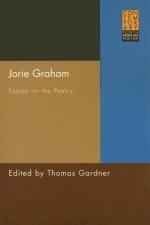|
This section contains 3,726 words (approx. 13 pages at 300 words per page) |

|
SOURCE: "The Big Hunger," in The New Republic, January 27, 1992, pp. 36-9.
In the review below, Costello argues that while Graham's style has changed in her first four books, her philosophical quest remains the same.
"Poetry implicitly undertakes a critique of materialist values," Jorie Graham argued in her introduction to The Best American Poetry 1990. It competes with the comforts of "story," which sprays "forward over the unsaid until it [is] all plot," and it competes with the power of images, our culture's "distrust of speech and of what is perceived as the terminal 'slowness' of speech in relation to the speedier image as a medium of sales." Poetry has responded too timidly, she believes, to the challenges of commercial culture, and retreated into a narrow realm of trivial reflections, decorative forms, and platitudes.
Graham has taken it upon herself in her recent work to confront the power of plot...
|
This section contains 3,726 words (approx. 13 pages at 300 words per page) |

|


